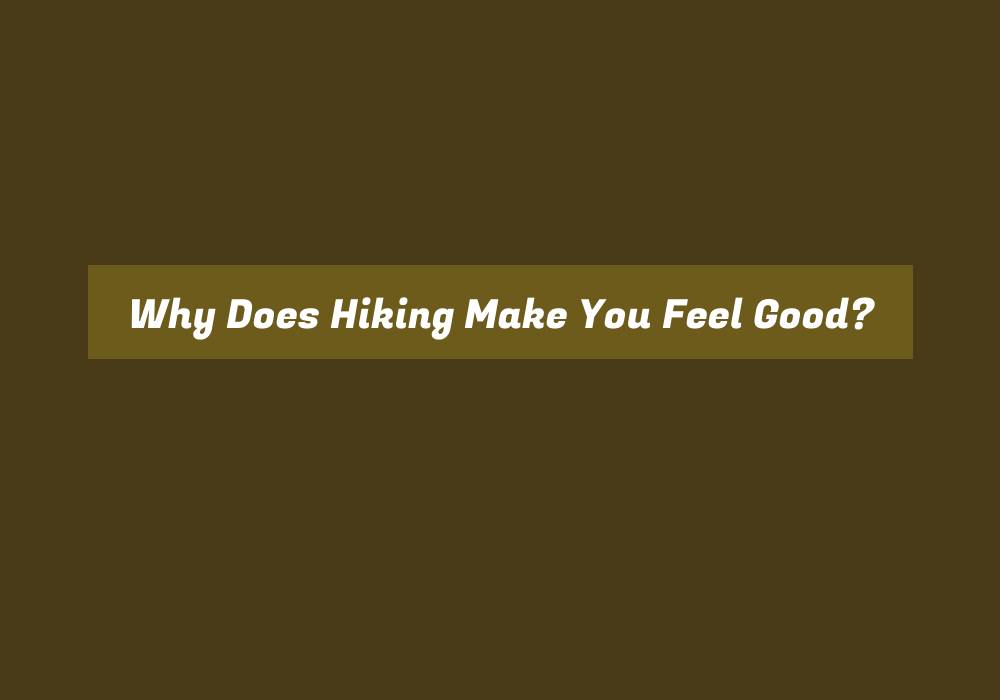Hiking is one of the most popular outdoor activities for good reason – it provides numerous mental, physical, and emotional benefits that can leave you feeling rejuvenated. But why exactly does hiking make you feel so good? There are several key reasons.
Mental Benefits of Hiking
Reduces Stress and Anxiety
Being out in nature inherently reduces stress and anxiety. Studies show that spending time outdoors decreases the stress hormone cortisol and triggers the release of endorphins, the “feel good” chemicals in the brain. The physical exertion involved in hiking also helps reduce tension and clear your mind.
Boosts Creativity
The peacefulness of natural surroundings combined with the rhythm of walking helps boost creative thinking. Hiking allows your mind to wander freely, provides new sensory experiences, and increases oxygen flow to the brain – all factors shown to stimulate creativity.
Improves Mood
Research shows that being out in nature elevates mood significantly more than being in urban environments. The sights, sounds, and smells of the outdoors have a calming effect, and being disconnected from technology reduces mental fatigue. Hiking’s ability to reduce stress and boost endorphins also plays a role in mood improvement.
Physical Benefits of Hiking
Promotes Heart Health
Hiking involves continuous aerobic activity which has been proven to strengthen the heart and reduce the risk of heart disease. According to studies, regular hiking can lower blood pressure, cholesterol, and resting heart rate. The elevation changes encountered while hiking makes the heart work even harder.
Burns Major Calories
A 155-pound person can burn around 400 calories per hour of hiking, with more strenuous hiking at high elevations burning over 500 calories per hour. Over the course of a longer hike, the calorie expenditure adds up rapidly. Hiking engages all the major muscle groups and is considered a vigorous form of exercise.
Strengthens Bones and Muscles
The challenging nature of hiking, especially when going uphill or with a weighted backpack, builds stronger leg muscles, glutes, core muscles, and bones. The varied terrain encountered while hiking engages a wide range of muscles and improves balance and stability.
Here is a table summarizing the physical benefits of hiking:
| Physical Benefits | Description |
|---|---|
| Promotes Heart Health | Strengthens heart, lowers blood pressure & cholesterol |
| Burns Major Calories | Up to 500 calories burned per hour of strenuous hiking |
| Strengthens Bones & Muscles | Engages all major muscle groups, builds leg strength |
Emotional Benefits of Hiking
Provides a Sense of Accomplishment
Finishing a hike gives hikers a real sense of achievement that boosts confidence and self-esteem. Pushing yourself physically and mentally to summit a peak or complete a challenging trail is very rewarding. Long hikes in particular provide a major morale boost.
Promotes Mindfulness
The natural setting and rhythm of hiking allow you to be fully present in the moment. Without the distractions and sensory overload of daily life, you can find a sense of calm through mindfulness of your surroundings. Being among nature reminds you of what really matters.
Creates Appreciation
Being immersed in the splendor of the outdoors – from grand vistas to tiny wildflowers – fosters a deep appreciation for the natural world. It reminds us of nature’s power to nourish our bodies and souls. Hiking allows us to feel gratitude for these gifts we too often take for granted.
Other Benefits of Hiking
- Improves sleep quality
- Boosts immunity and lowers inflammation
- Increases vitamin D absorption from sunlight
- Promotes mindfulness and gratitude
- Fosters a sense of adventure and childlike wonder
- Provides opportunities for social bonding
Spending time in nature clearly provides a wide range of benefits for both physical and mental health. The combination of aerobic activity, stress reduction and exposure to natural beauty leads to an overall sense of rejuvenation that makes hiking such a great way to improve mood and outlook.
Conclusion
In summary, hiking is beneficial in numerous ways:
- Mentally it reduces anxiety and stress, enhances creativity, elevates mood, and provides a sense of accomplishment.
- Physically it promotes heart health, burns calories, and strengthens the bones and muscles.
- Emotionally it fosters mindfulness, appreciation, and adventure.
The synergistic mental, physical, and emotional benefits explain why hiking makes you feel so rejuvenated. In our technology-driven modern lives, hiking provides a perfect way to recharge in nature. So the next time you need a mood boost or want to get in shape, lace up those boots and hit the trails!
Frequently Asked Questions on Why Hiking Makes You Feel Good
What is hiking?
Hiking is walking outdoors in natural areas or wilderness on established unpaved trails. It can range from relaxed walking to strenuous treks up mountains. Hiking engages the body and mind and allows close contact with nature.
How does hiking reduce stress?
Being out in nature lowers the stress hormone cortisol. The physical exertion also relieves tension. Disconnecting from technology reduces mental fatigue. Peaceful natural environments help clear the mind.
Does hiking improve cardiovascular health?
Yes, hiking strengthens the heart muscle, lowers blood pressure and cholesterol, and reduces resting heart rate through aerobic activity and elevation changes which make the heart work harder.
How many calories can you burn hiking?
On average, a 155-pound person will burn around 400 calories for every hour of hiking. More intense hiking with steep grades or weighted backpacks can burn over 500 calories per hour.
Does hiking help combat depression?
Research shows hiking effectively alleviates depression and negativity. The exercise, stress reduction, creativity boost, and mood enhancement hiking provides make it a great therapy for depression.
What muscles does hiking work?
Hiking works all the major muscle groups including the legs, glutes, core, back, and arms. Uphill hiking emphasizes hamstrings and glutes. Downhill engages quads. Varied terrain targets a wide range of stabilizing muscles.
Can hiking help you lose weight?
Yes, hiking is an excellent form of exercise for weight loss due to the high-calorie burn. Hiking also builds metabolism-boosting muscle. Steeper hikes burn even more calories. Weighted hiking maximizes calorie expenditure.
Is hiking good for the immune system?
Being active outdoors boosts immune cells and fighting capability. Hiking also lowers inflammatory hormones. Spending time in nature increases protective bacteria on the skin. So hiking strengthens overall immunity.
Does hiking increase vitamin D levels?
Yes, hiking allows greater sun exposure which enables more vitamin D production. But use sun protection and limit peak sun hours. Vitamin D plays many important roles including immune function, bone health, and mental health.
Can hiking benefit mental health?
Absolutely. Hiking reduces anxiety and depression, elevates mood, boosts creativity, sharpens focus, and fosters mindfulness and appreciation. The combination provides a major mental health boost.
Is hiking safe?
Hiking has minimal risks beyond standard exercise exertion but take proper precautions. Research trails, bring supplies and navigational tools, dress for conditions, be aware of wildlife, and tell someone your plans. Don’t hike beyond your fitness level.
What should you wear when hiking?
Wear lightweight, breathable layers you can add or remove. Use moisture-wicking fabrics. Pack essentials like hiking shoes, hat, sunglasses, map, sunscreen, insect repellent, first aid kit, headlamp, knife, food and water.
How can hiking improve sleep?
Hiking tires the body which makes it easier to fall and stay asleep. Being outside helps reset the circadian rhythm. Reduced anxiety, elevated mood, and exercised muscles also prime you for deeper, more restorative sleep.
Can you hike while pregnant?
Yes, hiking is an excellent pregnancy exercise. Focus on easy to moderate trails to avoid falls and overexertion. Stay hydrated, use trekking poles for balance, and stop immediately if uncomfortable. Check with your doctor first.
Is hiking a good workout for seniors?
Hiking is a great low-impact activity for seniors that improves strength, balance, and heart health. Start with flat trails and progress cautiously to avoid injury. Use trekking poles for stability. Stay hydrated and rested between hikes.
What are the best places to go hiking?
Some top hiking destinations include the Grand Canyon, Yosemite, Zion, Rocky Mountain National Park, Mount Rainier, Glacier National Park, Olympic National Park, Torres del Paine, Patagonia, Machu Picchu, Mount Fuji, Swiss Alps, and High Tatras.
Can hiking help you live longer?
Yes, studies show hiking and other aerobic activities that elevate heart rate reduce the risk of early death by up to 70%. The overall fitness and mental health improvements hiking provides aid longevity as well.
How can you start hiking as a beginner?
Start with short, flat trails and work up gradually. Get the right hiking gear. Pack adequate food, water and navigation. Learn how to use a map and compass. Join group hikes or find a hiking mentor. Condition muscles through stair climbing or inclined treadmill walking.
What should you do before going on a long hike?
Get in hiking shape through regular shorter hikes. Break in hiking boots and test gear like backpack and trekking poles. Study the route and conditions. Pack adequate food, water, layers, first aid and navigation tools. Tell someone your itinerary. Check the weather forecast.
You May Also Like

My name is David James I am an adventurous hiker based in California. Through this weblog, I percentage my passion for exploring nature’s wonders, documenting breathtaking trails and hidden gemstones.



